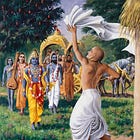Fall-downs of leaders and our individual choices
Spiritual leaders sometimes fall, and some abuse their positions. It happened in the past, happens in the present and will probably continue into the future. What to do about it?
There are many posts on social platforms mentioning the wrongdoings of gurus, sannyāsis, and other spiritual authorities. There were indeed many falls and misuse of power in the past, and some of it still happens in the present and will probably continue into the future. Many devotees in exalted positions committed mistakes (due to actions or negligence), just like most of us also commit mistakes and do our share of harm to others.
One point to keep in mind in such cases, however, is that the spiritual process of Krsna Consciousness is practically the only process that allows one to factually change his mentality and behavior and become purified to the core. There is no sin that is great enough not to be forgiven when one sincerely adopts the process of devotional service. Valmiki was a great thief and killer, but after chanting the name of Rama became completely purified and was able to write the great epic Ramayana.
There are also cases of sadhus who start on the path, fall down at some point, but later continue with renewed strength, like in the case of Bilvamaṅgala Thākura, who was practicing since childhood, having taken birth in a family of Brahmanas, fell down at some point with a prostitute, but later went back to the path much more determined and eventually became one of our most revered ācāryas.
Similarly, one can start his life in a family of meat-eaters, start practicing Krsna Consciousness later, fall down or commit mistakes at some point, resume on the spiritual path with renewed enthusiasm, humbled by his past mistakes, and in the end become a saintly person, just like Valmiki or Bilvamaṅgala Thākura. There is always a chance for redemption and forgiveness, although it is still up to the individual to take it or not.
Naturally, if one is abusing his position, that's a different story, but advanced devotees should not be judged by mistakes in the far past if they were able to reform themselves and are seriously following the spiritual path since then.
Another point to be understood, however, is that people (even many devotees) simply put, hate gurus, sannyāsis, and sadhus. Many just hate authorities, and in our movement, gurus and sannyasis are usually the highest authorities. Many have unconscious hate for that. Just as people criticize politicians, artists, and others in a position of power or privilege, it's common for devotees to criticize and find faults in leaders, be it based on facts or fiction. This is just a natural component of human psychology. Due to that, people tend not just to spread but also amplify whatever mistakes leaders made in the past and present, and when others who also internally have this tendency of hate for authority come in contact with it, they also join.
The problem with this approach is that the principle of authority is essential in spiritual life. One can't really advance in the spiritual path without having spiritual teachers and role models. There is naturally also the problem of Vaishnava aparādha, which can also be a serious issue. As mentioned by Srila Bhaktivinoda Thākura in the Harīnāma-cintāmaṇi, this criticism of sadhus prevents one from advancing in spiritual life, which ends up creating a class of individuals who, incapable of practicing spiritual life seriously, take the posting of insults as their daily sādhana.
As mentioned by Bhīṣmadeva in his discourse to King Yudhiṣṭhira before abandoning his body, one who sees good qualities in others gradually develops their good qualities, while one who criticizes others gradually absorbs their sins and vices. If one is in a position of power and abuses his position, he will certainly be punished, be it directly by the Lord or by the forces of nature. There is no fault in calling a thief a thief, but if one criticizes an innocent person (be it someone who did not commit what he is being accused of, or someone who in fact did it, but became purified due to later repentance and practice of devotional service) becomes punishable.
Every one of us has free will to choose our path in life, but it's important to understand that we will also have to accept the results of our actions. The success of our spiritual life certainly depends on our individual choices, and when we understand how things work, we have the opportunity of making better choices.
If you read this article to the end, give it a like or write a commentary. This makes Substack recommend it to more people.
Read also:






Thanks for your posts which I find to be very good and helpful. Regarding the falldowns of revered spiritual leaders, I cannot stress the damage this causes to their followers or disciples. They may be forgiven for their irresponsible behaviour but they should never under any circumstances be given any position of spiritual authority within ISKCON.
They may be a humble practitioner of bhakti yoga only. It is very disturbing to hear that abusers of children, adults and ISKCON in general are giving classes and receiving respect as some kind of leader. They had their chance and blew it! The society we inhabit should understand that the victims of these abusive people have rights and shouldn't have to suffer more than they already have at the hands of cheating abusive individuals.
All forgiveness is there for such false leaders but zero tolerance is there for the abuse they have perpetrated, especially on minors.